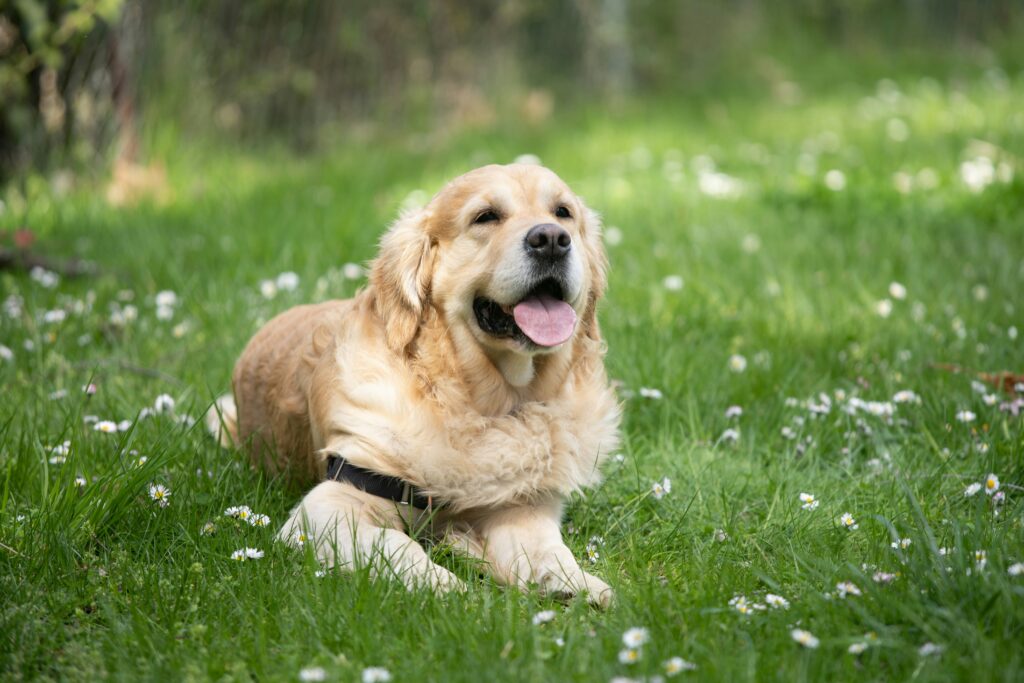Golden Retriever 101: Your Complete Guide

Golden Retrievers, with their warm smiles and gentle spirits, have captured the hearts of millions worldwide. Whether you’re a seasoned dog owner or a first-time pet parent, this guide is your golden ticket to understanding and caring for this beloved breed.
We’ll dive deep into the world of Golden Retrievers, exploring everything from their playful puppyhood to their wise old age. From essential care tips to expert training advice, we’ve got you covered. So, let’s embark on this paw-some journey together!
Table of contents
- Introduction to Golden Retrievers
- Golden Retriever Breed History
- Golden Retriever Breed Overview
- Golden Retriever Temperament and Personality
- Golden Retriever Puppy Care
- Golden Retriever Training
- Health and Wellness
- Nutrition and Diet
- Exercise Needs of Golden Retrievers
- Golden Retriever Grooming and Shedding
- Lifespan and Senior Care
- Golden Retrievers and Family Life
- Best Toys for Golden Retrievers
- Conclusion
Introduction to Golden Retrievers
Golden Retrievers are the epitome of a loving, friendly, and loyal family pet. Originating in Scotland, they were initially bred for hunting and retrieving game. Today, Golden Retrievers are known as all-around great companions who can be service dogs, therapy animals, and even participate in dog sports. With their high intelligence, love for people, and eagerness to learn, they quickly become part of the family.
Fun Fact: Golden Retrievers are known to retain their puppy-like playfulness even as they age, giving them a long-lasting charm.
Golden Retriever Breed History
Golden Retrievers were first bred by Lord Tweedmouth of Scotland in the 19th century to retrieve waterfowl. By mixing Yellow Retrievers with the now-extinct Tweed Water Spaniel, along with breeds like Bloodhounds and Irish Setters, he created a dog with a keen sense of smell, intelligence, and resilience to Scotland’s weather.
Interesting Fact: It’s rumored that the Golden Retriever’s signature golden coat was a happy accident, as Lord Tweedmouth valued hunting abilities over aesthetics.
Golden Retriever Breed Overview
Golden Retrievers are medium-to-large dogs known for their dense, water-repellent coat, usually golden or cream in color. They’re athletic and have a sturdy build, making them suited to both outdoor adventures and indoor companionship.
Breed Traits:
- Height: 21.5 to 24 inches
- Weight: 55-75 pounds
- Coat: Water-repellent, thick, and ranges from light cream to dark golden.
Helpful Resource: For detailed breed standards, check out the American Kennel Club’s Golden Retriever Standards.
Golden Retriever Temperament and Personality
Golden Retrievers are famous for their even temperament and are typically friendly, tolerant, and good-natured. They’re known to get along well with children, other pets, and even strangers, making them excellent family dogs.
Key Personality Traits
- Friendly: Golden Retrievers are incredibly welcoming, often treating strangers as friends.
- Intelligent: Ranked as one of the most intelligent dog breeds, they’re highly trainable.
- Playful: Golden Retrievers retain a youthful spirit, enjoying play well into adulthood.
Fun Fact: Golden Retrievers are among the top 5 most intelligent dog breeds, able to learn hundreds of commands and skills!

Golden Retriever Puppy Care
Bringing home a Golden Retriever puppy is exciting but requires preparation and consistent care. Here’s how to make the transition smooth for both of you.
- Socialization: Expose your puppy to various sounds, sights, people, and animals early on.
- House Training: Establish a routine; Golden Retrievers respond well to crate training.
- Vaccinations and Vet Care: Keep up with vet visits for vaccinations, deworming, and flea prevention.
- Teething and Chewing: Goldens love to chew, so provide plenty of safe chew toys.
Pro Tip: Golden Retrievers are known for chewing, especially as puppies. Be sure to “puppy-proof” your home and keep valuables out of reach.
Golden Retriever Training
Golden Retrievers are incredibly intelligent and respond well to positive reinforcement. Training should be consistent, with clear commands and rewards.
Puppy Training
- Socialization: This is crucial for a well-rounded adult dog.
- Basic Commands: Start with “sit,” “stay,” and “come” using treats and praise.
- Leash Training: Introduce leash training early to prevent pulling.
Adult Dog Training
- Advanced Commands: Teach commands like “heel” and “off.”
- Agility Training: Many Golden Retrievers excel in agility courses.
- Social Skills: Continue socialization to reinforce positive behavior.
Resource: For further training tips, refer to Petfinder’s Dog Training Guides.
Health and Wellness
Golden Retrievers are generally healthy but can be prone to certain genetic health issues.
Common Health Issues
- Hip Dysplasia: This common condition affects joint mobility and is more prevalent in larger breeds.
- Cancer: Golden Retrievers have higher cancer rates than many breeds, so regular check-ups are essential.
- Eye Conditions: They’re prone to Progressive Retinal Atrophy (PRA) and cataracts.
Helpful Resource: For health information and recommendations, check PetMD’s Golden Retriever Health Guide.
Nutrition and Diet
Golden Retrievers need a balanced diet with high-quality protein sources, healthy fats, and essential vitamins. Choose food that lists real meat as the first ingredient and avoid fillers like corn, soy, and artificial preservatives.
Tips for a Balanced Diet
- Puppy Diet: Feed a puppy formula with appropriate calcium and phosphorus ratios.
- Adult Diet: Opt for adult dog food with moderate protein and fat content.
- Senior Diet: Consider joint supplements and senior formulas as your dog ages.
Resource: Explore Chewy’s Nutrition Guide for Dogs for more options.
Exercise Needs of Golden Retrievers
Golden Retrievers are active dogs that thrive with daily exercise. Aim for at least 1-2 hours per day of varied physical activity.
- Fetch: Goldens love to retrieve, making fetch their go-to game.
- Swimming: Their water-resistant coat makes them strong swimmers.
- Hiking: A great way to give both mental and physical stimulation.
Fun Fact: Golden Retrievers’ “webbed” feet make them excellent swimmers, a throwback to their days as hunting companions in marshy lands!
Helpful Resource: Check out DogTime’s Guide to Dog Exercise for more exercise ideas.
Golden Retriever Grooming and Shedding
Golden Retrievers have a double coat that sheds year-round, with heavier shedding in spring and fall.
Grooming Checklist
- Brushing: Brush 3-4 times a week to reduce shedding and prevent matting.
- Bathing: Bathe every 4-6 weeks to keep their coat clean and fresh.
- Nail Care: Trim nails every 2-3 weeks to maintain healthy feet.
Fun Fact: Golden Retrievers have a water-repellent outer coat and a dense undercoat that helps keep them warm in cooler climates.
Resource: Explore Chewy’s Grooming Products for Golden Retrievers for helpful grooming supplies.
Lifespan and Senior Care
Golden Retrievers typically live 10-12 years. Regular veterinary care, a balanced diet, and moderate exercise help maximize their longevity.
Senior Care Tips
- Gentle Exercise: Adjust activity levels for aging joints.
- Comfortable Bedding: Orthopedic beds can help with joint pain.
- Routine Check-Ups: Senior dogs benefit from more frequent vet visits.
Golden Retrievers and Family Life
Golden Retrievers are ideal for family life, known for their gentle and friendly demeanor with children and other pets. They are patient, protective, and love to be included in family activities.
Best Toys for Golden Retrievers
Golden Retrievers are playful, so investing in quality toys is essential for mental and physical stimulation.
Top Toy Recommendations
- Fetch Toys: Look for durable rubber or tennis ball toys.
- Chew Toys: Golden Retrievers have strong jaws, so sturdy chew toys are a must.
- Puzzle Toys: Keep their mind sharp with interactive toys that challenge their problem-solving skills.
Resource: Check Amazon’s Best Toys for Large Dogs for more options.
Conclusion
As we wrap up this golden adventure, remember that a Golden Retriever is more than just a pet; they’re a loyal companion, a source of joy, and a furry family member. By providing them with love, care, and a stimulating environment, you can ensure a long and fulfilling life together.
So, whether you’re a seasoned Golden Retriever owner or a hopeful new pet parent, embrace the golden opportunity to share your life with this wonderful breed. After all, a life with a Golden Retriever is truly a golden life.

Frequently Asked Questions About Golden Retrievers
1. Are Golden Retrievers good family dogs?
Answer: Absolutely, Golden Retrievers are known for their friendly, gentle, and patient nature, making them excellent family dogs. They get along well with children and other pets, and their social nature means they thrive on companionship and being included in family activities. However, their size and energy level can sometimes be overwhelming for very young children, so early training and socialization are essential to make the relationship harmonious.
2. How much exercise do Golden Retrievers need daily?
Answer: Golden Retrievers are active and athletic dogs that require at least 1-2 hours of exercise each day. This can include walks, playtime, and mentally stimulating activities like fetch or agility training. Due to their history as working and hunting dogs, Golden Retrievers excel at activities involving running and retrieving. Regular exercise not only keeps them physically healthy but also helps prevent boredom, which can lead to destructive behaviors.
3. Do Golden Retrievers shed a lot, and how do you manage it?
Answer: Yes, Golden Retrievers shed quite a bit, particularly during seasonal changes in spring and fall. They have a double coat, which consists of a dense undercoat and a water-resistant outer coat. Regular grooming is essential to manage shedding. Brushing them 3-4 times a week will help reduce loose hair, and during heavy shedding seasons, daily brushing is recommended. Bathing every few months, along with regular nail trimming and ear cleaning, also keeps them looking their best.
4. What health issues are common in Golden Retrievers?
Answer: Golden Retrievers are prone to several hereditary health issues. The most common health concerns include:
- Hip Dysplasia: A genetic condition that affects joint health.
- Elbow Dysplasia: Similar to hip dysplasia, this impacts the front limbs.
- Cancer: Unfortunately, Golden Retrievers have a higher cancer rate than many other breeds.
- Eye Issues: They are susceptible to Progressive Retinal Atrophy (PRA) and cataracts.
Regular check-ups, a balanced diet, and a healthy lifestyle can help prevent or manage these conditions. Genetic screening by breeders can also minimize these risks.
5. What should I feed my Golden Retriever?
Answer: Golden Retrievers require a high-quality, balanced diet rich in protein, healthy fats, and essential vitamins. Look for dog food that lists real meat as the primary ingredient, avoiding artificial fillers and preservatives. Puppies need a diet with appropriate calcium and phosphorus ratios for healthy bone growth, while adults benefit from a moderate protein and fat content. Seniors may require lower-calorie food to avoid weight gain and added joint supplements to support aging bones.
6. Are Golden Retrievers easy to train?
Answer: Yes, Golden Retrievers are highly intelligent and eager to please, making them one of the easiest breeds to train. Positive reinforcement techniques work best with this breed, as they respond well to praise, treats, and playtime. Start with basic obedience training and socialization as a puppy, and gradually introduce more advanced commands. Golden Retrievers excel in agility, obedience, and even advanced skills like search and rescue or therapy work due to their intelligence and adaptability.
7. What is the average lifespan of a Golden Retriever?
Answer: The average lifespan of a Golden Retriever is typically 10-12 years, although some live longer with proper care. Factors influencing lifespan include genetics, diet, exercise, and regular veterinary care. Keeping your Golden Retriever at a healthy weight, providing mental and physical stimulation, and scheduling routine check-ups can all help to promote a longer, healthier life.
8. Do Golden Retrievers get along with other pets?
Answer: Yes, Golden Retrievers are generally very social and tend to get along well with other pets, including cats and other dogs. Their friendly and adaptable temperament means they are typically welcoming and tolerant of other animals. Early socialization and training can further support positive interactions with other pets in the household, reducing territorial behaviors and ensuring a harmonious environment.
9. How do I prevent my Golden Retriever from developing separation anxiety?
Answer: Golden Retrievers form strong bonds with their families and can be prone to separation anxiety if left alone for extended periods. To prevent this:
- Start Gradually: Introduce short periods of alone time, gradually increasing as they adjust.
- Create a Routine: Establish a regular schedule so your dog knows when to expect your return.
- Provide Entertainment: Use puzzle toys, chews, or a treat-dispensing toy to keep them occupied.
- Avoid Long Absences: If possible, arrange for a friend or dog walker if you’ll be gone for extended periods.
Training them to feel secure and self-reliant can go a long way in preventing separation anxiety.
10. What are some fun activities to do with a Golden Retriever?
Answer: Golden Retrievers are active, playful, and eager to join in on family fun. Here are some favorite activities:
- Fetch: Goldens are natural retrievers and love the game.
- Swimming: With their water-resistant coats, Golden Retrievers make excellent swimmers.
- Hiking: They love exploring trails and enjoy outdoor adventures.
- Agility Courses: This is great for mental and physical stimulation, and Goldens often excel in agility.
- Puzzle Toys: These keep their minds sharp and engaged, especially during quiet times at home.
Fun Fact: Golden Retrievers were originally bred to retrieve waterfowl, so they have an instinctive love for water and fetching games.





